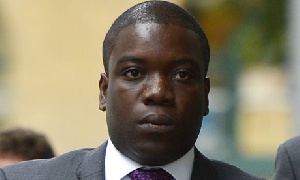UBS's losses in the financial crisis dwarfed a $2.3 billion (1.4 billion pounds) hit from a rogue trading scandal last year and caused longer-lasting damage, lawyers for accused fraudster Kweku Adoboli said in court on Monday.
Adoboli's lawyers have so far argued at his trial that he believed he was trading for the good of the bank, and that colleagues had turned a blind eye to his practices.
In a fresh tack on Monday, lawyers questioned Tom Naratil -- chief financial officer at UBS and the most senior executive to appear as a witness -- on the impact of other losses and probes on the Swiss bank and its share price.
Adoboli, 32, who was arrested in September 2011, is on trial at Southwark Crown Court accused of fraud and false accounting. He denies the charges.
Charles Sherrard, representing Adoboli, said UBS lost close to 50 billion Swiss francs (33.3 billion pounds) because of the financial crisis and its share price fell almost 80 percent between January 2008 and the day before the trading loss was uncovered in September 2011.
Naratil, appearing via videolink from New York, said that UBS's share price dropped 10 percent when the $2.3 billion loss was announced and had recovered eight days later.
Despite this recovery, Naratil said that the impact on UBS had been material.
"A double-digit decline in the stock price in a single day is a significant event," Naratil said.
The prosecution, which has portrayed Adoboli as a gambler routinely exceeding his trading limits and concealing trades, argued that the damage caused by one person in a day and by an economic crisis could not easily be compared, and did not in the second instance involve allegations of fraud at UBS.
Naratil, who described last year's trading loss as a "very trying time" for UBS employees, said about 500 people were made redundant at the bank after the trading scandal was exposed.
Asked to quantify how many of those layoffs resulted from the trading incident, Naratil said: "It would be hard to determine a percentage."
He added: "If you lose $2.3 billion more than you would otherwise, then you're more likely to lose more staff," Naratil said.
UBS had already announced in August it was shedding 3,500 staff as part of a broader cost cutting plan, but Naratil said that "it did not mean we were limited to cost reductions that were tied to that specific programme."
The investment bank's bonus pool was also cut by 60 percent, he said, adding however that the rogue trading loss was not the sole reason for this.
The trial continues.
General News of Tuesday, 16 October 2012
Source: Reutera
UBS rogue trader loss less than crisis damage, court told
Entertainment












